#sor juana ines de la cruz
Text
Sor Juana Inés de la Cruz
Born in 1648, Sor Juana Inés de la Cruz demonstrated a remarkable aptitude from a young age, displaying an insatiable curiosity for learning. By the age of fifteen, Sor Juana had already distinguished herself as a prodigy, captivating the court with her profound understanding of diverse subjects ranging from physics to philosophy, theology, and mathematics. Her family’s influential status gave her the position of lady-in-waiting at the colonial viceroy’s court.
Despite societal expectations for women of her time to pursue marriage along with numerous proposals, Sor Juana opted for a different path, choosing instead to dedicate herself to a life of religious contemplation and intellectual pursuit. In 1667, she entered the Carmelite convent, seeking a space where she could explore her passion for learning freely. However, it was not until she joined the Jeronymite order in 1669 that Sor Juana found the intellectual freedom she craved. Within the confines of the convent, she was able to host intellectual gatherings and engage in scholarly pursuits without constraint.
Sor Juana's commitment to learning did not go unnoticed, and she soon found herself entangled in ministerial debate and discussions. In 1690, she became involved in a dispute between bishops, defending her right as a woman writer to engage in intellectual discourse through her famous work "The Answer." Despite her eloquent defence, the Church, influenced by patriarchal norms of the time, ultimately forced Sor Juana to relinquish her literary pursuits and renounce her extensive library. Her decision to sell her cherished books and instruments and sign a document in her own blood, writing "Yo, la Peor de Todas" ("I, the worst of all women"), which stands as a poignant symbol of her defiance in the face of censorship and oppression.
Even in the midst of adversity, Sor Juana remained committed to her principles and to serving others. During an epidemic, she cared for the sick and infirm, demonstrating compassion and selflessness until her own health deteriorated. Sor Juana's legacy as "The Nun of Mexico" and "The Tenth Muse" endures through her extensive body of work, which encompasses classical drama, comedy, satirical poetry, and sacred and profane verse. Her writings continue to inspire generations of scholars, artists, and feminists, embodying the enduring power of intellect, courage, and resilience in the pursuit of knowledge and truth.
https://public.websites.umich.edu/~dfrye/SORJUANA.html https://www.philamuseum.org/collection/object/39031
#sor juana inés de la cruz#sor juana#mexico#spanish golden age#women in history#colonialism#history#jeronymite#sor juana ines de la cruz
15 notes
·
View notes
Text

from Post Colonial Love Poem by Natalie Diaz
#sor juana ines de la cruz#poesia#post colonial love poem#natalie diaz#mine#studyblr#studyspo#dark academia#light academia#booklr#writing#chaotic academia#literature#classical academia
25 notes
·
View notes
Text
Thought I should inform the world about her
Juana Vázquez Gutiérrez, or Saint Juana de la Cruz, or simply, La Santa Juana (The Saint Juana)


She was a spanish nun during the 16th century.
She claimed than she was meant to be a male when she was in her mother’s womb, but than thanks to the Virgin Mary’s intervention, her gender changed before she was born, transforming her from male to female. And than that was the reason why she had an Adam’s apple.
She is described as seeing Jesus in weird (may I say queer) ways. She affirmed than Jesus could become either father, or mother, or husband, or wife, or friend, depending on what the person needed to see. Her version of Jesus was so expansive, than one gender wasn’t enough to contain Jesus.
She also claimed than in a vision she saw the streets of heaven populated with matrimonial beds, and than in each one was God with a saint (male), or a saint (female).
When she was 15, her family wanted her to marry a man, so she ran away from her home dressed in “men’s” clothes. She arrived to a Franciscan convent, where she also had to dress as a man. She did it by choice. She was part of a community of Franciscan women.
Around 1509, she became Madre Juana (Mother Juana)
She was an abbess, a preacher, a parish leader, visionary, theologian, and an advocate for her own group of women.
(Not to be confused with Sor Juana Inés de la Cruz, feminist lesbian mexican nun and writer from the 17th century, who is also an icon)
41 notes
·
View notes
Text



Fragmento del poema 'Hombres necios...' de Sor Juana Inés de la Cruz.
Hombres necios que acusáis
a la mujer sin razón,
sin ver que sois la ocasión
de lo mismo que culpáis:
si con ansia sin igual
solicitáis su desdén,
¿por qué queréis que obren bien
si la incitáis al mal?
(...)
Con el favor y desdén
tenéis condición igual,
quejándoos, si os tratan mal,
burlándoos, si os quieren bien.
Siempre tan necios andáis
que, con desigual nivel,
a una culpáis por cruel
y a otra por fácil culpáis.
(...)
Bien con muchas armas fundo
que lidia vuestra arrogancia,
pues en promesa e instancia
juntáis diablo, carne y mundo.
#international women's day#mexico#8m#8 marzo#fotos tumblr#fotos#photography#resistencia#women's march#Blood in paradise#poetry in spanish#poesía#poetry#sor juana ines de la cruz
3 notes
·
View notes
Text
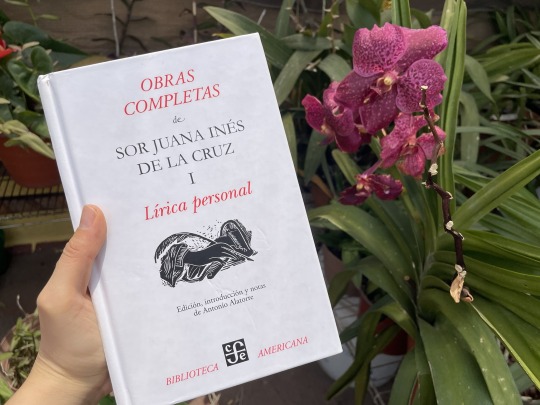
JOMP Book Photo Challenge || May || 21 || Read For School
#jompbpc#justonemorepage#book photo challenge#sor juana#sor juana ines de la cruz#poetry#mexican poetry#sor juana inés de la cruz#books and poetry#books and flowers#books and plants#booklr#bookblr#leerreadinglire
10 notes
·
View notes
Text
"Kadınların direnişini kırmak için ısrarla uğraşır, sonra da onları hoppalıkla suçlarsınız.
Kadını elde edene kadar göklere çıkarır, amacınıza ulaşınca da aşağılarsınız.
Hangisi daha zavallı; para için günah işleyen kadın mı; yoksa günah işlemek için para ödeyen erkek mi?
Hepinizin aynı derecede suçlu olduğunuz düşüncesi sizi niye bu kadar şaşırtıyor?
Ya onları ne hale getirdiyseniz o halde sevin, ya da onları sevebileceğiniz bir hale,,
Sor Juana Ines De La Cruz (1651-1695)

Painter, by Andrew Wyeth - Gone Ashore
#Sor Juana Ines De La Cruz#şair#şiir#şiirler#şiirheryerde#art#yazar#kitap#edebiyat#andrew wyeth#painter#artist
28 notes
·
View notes
Text
No estudio por saber más, sino por ignorar menos.
Sor Juana Inés de la Cruz.
#Libros#Quotes#Quote#Books#sor juana ines de la cruz#Estudiar#Saber#Aprender#Vida#Frases#frases de libros
29 notes
·
View notes
Text
Oh how, in your beautiful sun,
my ardent love set ablaze,
enflamed and fed by your brilliance,
it forgot about the dangers.
Redondilla 91 by Sor Juana Inés de La Cruz
9 notes
·
View notes
Text




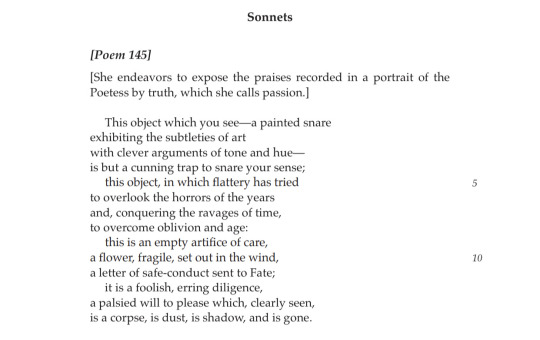
- Sor Juana Inés de la Cruz, poem 145
#poetry#sor juana ines de la cruz#the tenth muse#writing#dark academia#romantic academia#romantic literature#literature#passion#university#i’m in lecture rn and this poem made me feel some things
10 notes
·
View notes
Text

6 notes
·
View notes
Text
Soneto | Sor Juana Inés de la Cruz
Que contiene una fantasía contenta con amor decente
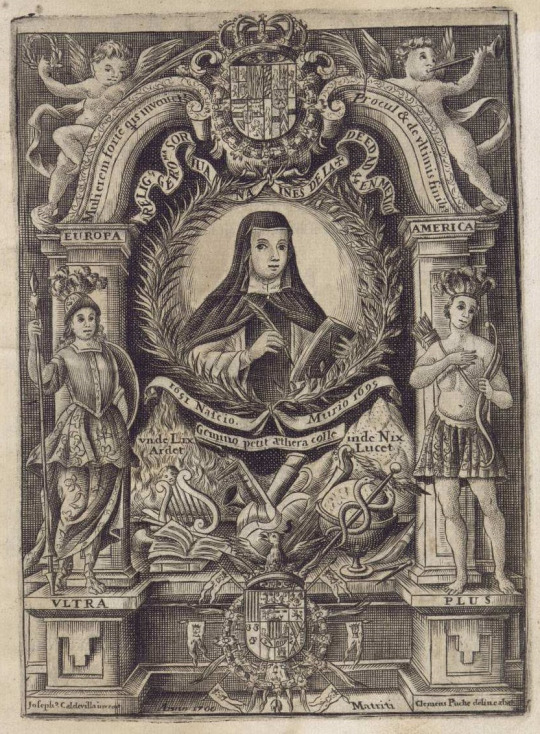
Detente, sombra de mi bien esquivo
imagen del hechizo que más quiero,
bella ilusión por quien alegre muero,
dulce ficción por quien penosa vivo.
Si al imán de tus gracias atractivo
sirve mi pecho de obediente acero,
¿para qué me enamoras lisonjero,
si has de burlarme luego fugitivo?
Mas blasonar no puedes satisfecho
de que triunfa de mí tu tiranía;
que aunque dejas burlado el lazo estrecho
que tu forma fantástica ceñía,
poco importa burlar brazos y pecho
si te labra prisión mi fantasía.
9 notes
·
View notes
Text
Va borrando el agua lo que va dictando el fuego
9 notes
·
View notes
Text
When You Pursue Me, World by Sor Juana Inez De La Cruz (translated by Rhina P. Espaillat)
When you pursue me, world, why do you do it?
How do I harm you, when my sole intent
is to make learning my prize ornament,
not learn to prize ornament and pursue it?
I have no treasure, and I do not rue it,
since all my life I have been most content
rendering mind—by learning—opulent,
not minding opulence, rendering tribute to it.
I have no taste for beauties that decay
and are the spoil of ages as they flee,
nor do those riches please me that betray;
best of all truths I hold this truth to be:
cast all the vanities of life away,
and not your life away on vanity.
4 notes
·
View notes
Text
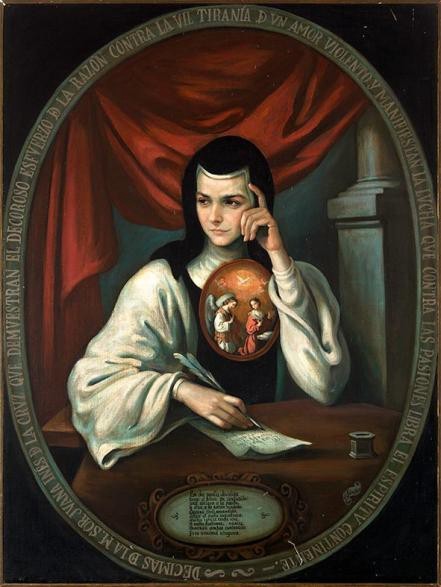
A beautiful merging severed in Laura,
O immortal soul, O glorious spirit,
why did you leave a body so beauteous
and why to that soul have you bid farewell?
But now it has penetrated my reason
that you endure so rigorous a divorce
so that on the last day you can with joy
once again become eternally joined.
Begin your rapid flight, O fortunate soul,
and released now from your beauteous prison,
leaving its rosy hue turned to ice,
rise up to be crowned by luminous stars,
for all of boundless heaven is required
so that you will not miss your beauteous home.
- Sor Juana Inés de la Cruz (Sonnet 188, "On the Death of the Most Excellent Señora Marquesa de Mancera), trans. Edith Grossman. Original Spanish below, with favorite parts bolded in both correspondingly.
Bello compuesto en Laura dividido,
alma inmortal, espíritu glorioso,
¿por qué dejaste cuerpo tan hermoso
y para qué tal alma has despedido?
Pero ya ha penetrado mi sentido
que sufres el divorcio riguroso,
porque el dia final puedas gozoso
volver a ser eternamente unido.
Alza tú, alma dichosa, el presto vuelo
y, de tu hermosa cárcel desatada,
dejando vuelto su arrebol en hielo,
sube a ser de luceros coronada:
que bien es necesario todo el cielo
para que no eches menos tu morada.
7 notes
·
View notes
Photo

(vía Interpol y Sor Juana en una clase legendaria)
4 notes
·
View notes
Text
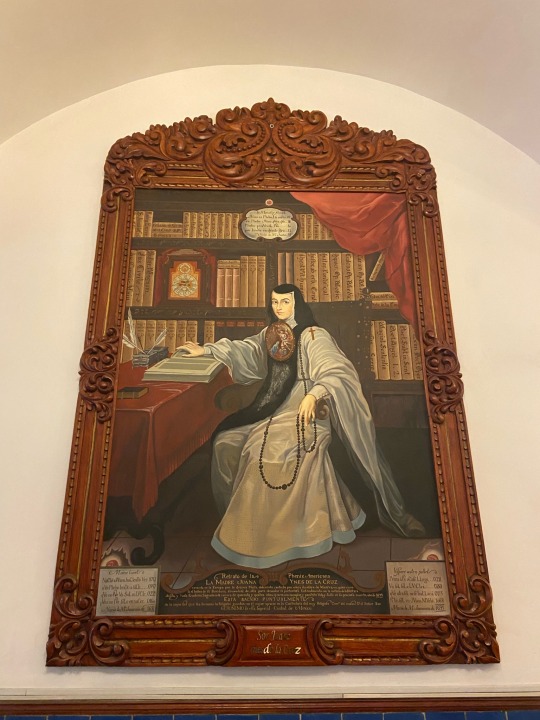




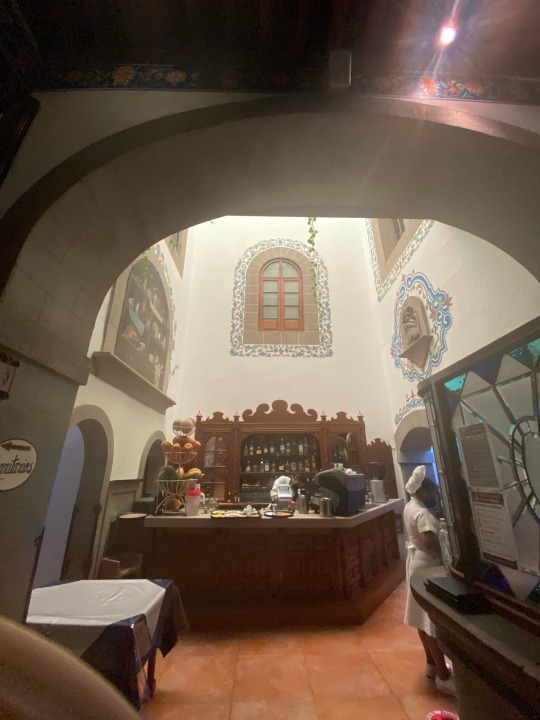
Sor Juana painting in this beautiful restaurant in CDMX. Immaculate vibes & bomb chilaquiles
2 notes
·
View notes